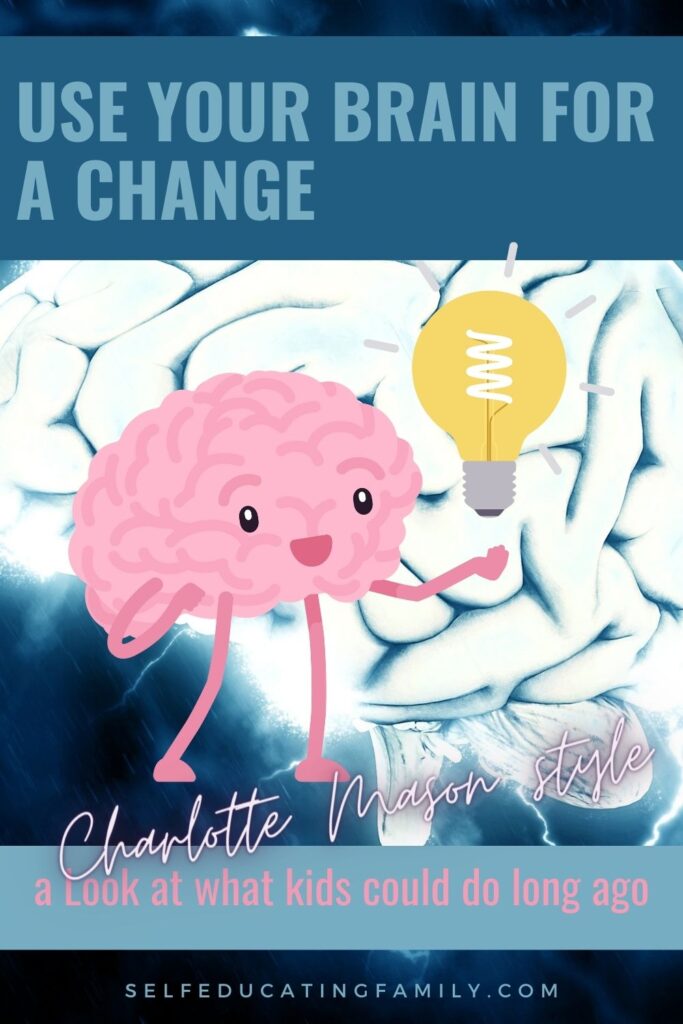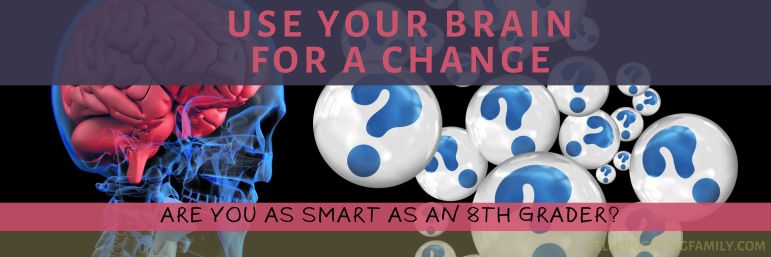What’s inside: Some say using your brain is a lost skill. As homeschoolers, we teach our children to become independent learners. But could they pass an 8th grade test from a hundred years ago? Can you do it? Take a look at my dismal results for an encouraging smile.
The lost art of using your brain
Is using your brain for a change a “lost art?” I want to convince you that we can challenge our young students more than we do and we can even demand a bit more of our own brains.
Keep in mind: “Challenge our students more” does not mean make them do more worksheets – Charlotte Mason schools gave students all or part of the afternoons “off” for structured free time. It allows the mind time to absorb and analyze the ideas that it comes across.
Disclosure: This post contains affiliate links, meaning that if you make a purchase after clicking through, SelfEducatingFamily will receive a small commission at no extra cost to you.
What this article is not
Before you get too far, I want you to know what this post is not going to talk about. This is NOT a formula for positive thinking – although that’s lovely. There are many articles on how to use your brain to change the way you think simply by asking the right questions. If you want to check out some of those articles, see my For Further Study section at the end of this post. But I will summarize my favorite questions here that can rewire your brain to think more positively. Questions like:
- Who can I help today?
- What am I grateful for?
- What can I learn today? (or What can I learn from this situation?)
- What’s one thing I can do today to make progress?
- If I stopped and smelled the roses, what can I notice about them? (OK – I made this one up myself, but the others are all questions that professional life coaches suggest to ask yourself which will make your brain change. It’s science. Look it up!)
The other “using your brain for a change” that this post is NOT about is the book by that name. It goes into NLP, which I’m not a fan of because some practitioners use it to manipulate people.
Be that as it may….
Shocking: What is this post actually about?
I will show the final exam questions for 8th graders from over 100 years ago. It will shock and amaze you. And confession: I don’t think I could pass this test! See what you think.
Why?
I’ve been looking at Charlotte Mason’s (CM) 20 Principles of a Philosophy of Education and the topic raises a number of questions. (These are not questions that will change your brain as much as perhaps change the way you teach and learn.) For instance, questions like:
- What do I think the purpose of education is?
- Are well-rounded, thinking citizens better for communities, towns, and countries?
- Why does the state-run public school system want to have people think in particular ways and exactly what are those ways implying about the nature of children?
- What should a society want from its people?
- With all the advances in technology, improvements in life expectancy, increases in leisure time, and other supposed progress in civilization, WHY can’t we pass a test that 8th graders could pass over a hundred years ago?
The Lost Art of Using Your Brain
Perhaps, we weren’t taught to think properly.
Remember the Little House on the Prairie story in which Laura is almost done with school and has to pass the big final recitation in front of the whole town? She recites half of world history from memory. And she lands the big teaching job as a teen.
The real Laura that the story is based on had “ordinary” school in South Dakota in 1882.
Could you do that?
I always thought that I lost my brain due to having kids (hee hee! They do take a lot of mental effort sometimes, though, don’t they?)
At least in my studies since my school days, I’ve learned about brain elasticity – it’s not too late to learn!
Another example
I will look at some of the questions on the tests given in CM schools in England in the 1920s from each of the many subjects taught in this generous curriculum.
The source of these questions was originally from the PNEU programs, lovingly curated by the wonderful Ambleside Online. I highly encourage you to peruse these resources. All quotes are from this source.
Sample 8th-grade exam questions with commentary
Warning: This is not a short test, nor does it have any multiple-choice questions. It’s all essays and writing AND grammar and spelling count. I think that makes most people under 30 fail right there! But not your kiddos if they use a rigorous curriculum like Charlotte Mason. I think even Ron Paul curriculum high school students would do fine on it since that is extremely rigorous and heavy on writing.
Here goes… The following are from 5 different years of testing “Year IV” (approximately Grade 8 or 9) circa 1920s.
Writing
Write 10 lines of poetry from memory. I might be able to do this one if I picked something easy like Lear’s The Owl & the Pussycat. I think I only know about 5 lines of my other favorite poems like The Road Less Traveled or Tiger, Tiger.
Dictation
I could do this section! Simply write what I hear. In actuality, this is a grammar and spelling test in essence. The material choice would be from something studied during the term, like a soliloquy from Shakespeare or a passage from A History of English Literature.
Composition
I would be at the mercy of the topic that you had to choose from. For instance, “Write an essay in the style of Carlyle”. After I got over the “Who’s Carlyle?” I might try to select a different essay. I could do the “Write something for the [Charlotte Mason Schools Parent’s] Magazine.”
This section had 3 essays or poetic compositions. Some of them had choices: for instance, compose “some lines on (a) some trees or (b) Ulysses or (c) signs of the times.”
Can you compose some lines?
Grammar
This section had 3 questions.
- Parse the words in a selected poem, with 6 words highlighted from a poem that they would have studied, like Hiawatha. For example, parse the words in bold:
- “I shot an arrow into the air-
It fell to earth, I knew not where;
For, so swiftly it flew, the sight
Could not follow it in its flight.”
- List various Rules of grammar (e.g. “What are the rules for the comma, the colon, and the semi-colon?”) or define several Latin/suffixes or roots with examples (e.g. “define and give examples of these suffixes –ling, wise, er, an, any, ice, lent, ire.”)
- This one varied depending on question 2. If Latin was omitted before, it showed up here. This one usually had examples. e.g. “What do you understand about Iambic verse? Give examples.”
I was excited by the Iambic verse question – I know what that is because I wrote my Poetry Hater’s Guide for Loving Poetry.*
* Also Available on Etsy
I could probably get half of these grammar questions, more or less. And that’s a bit crazy because I LOVE grammar and thought I knew it. But I guess I just know it “more or less”. Or maybe just “more than average people” which may not be that much!
Literature
The literature section posed 3 or 4 open-ended questions. Most were specific, like, “ What do you know of the “Parson Poet,” Herrick and Marvell? Quote some lines or passages.”
Some of the more generic ones I could handle, like, “Name some poets of today with the poems you know.” Although, now that I think about it, I don’t know any poets of today, unless Edward Lear or A.A. Milne count.
Some of the questions were about specific works and authors to which you had to respond in a style like the author. For instance, “What do you know about “Atlantis”? Write, in Bacon’s style, an essay of his.”
I would pretty much fail this section. But except for drama & Shakespeare, my formal education was geared towards science & technology – I’ve been making up lost time by homeschooling.
A side note about the wonders of homeschooling
I have to put in a plug at this point for learning with your kids. With a living books curriculum, you read the books and narrate back. You don’t really have to know it beforehand necessarily. And with homeschooling, moms often do “pre-reading” of the books to make sure the material is appropriate for your specific kids.
Interestingly, it gets harder to keep up with the reading list of your kids as they get to the high school age. Still, if you listen to or read their narrations, you get a feel for each book and can select which ones you want to read.
I’ve gone back to the Ambleside Booklists to keep up with my “great literature” book reading.
Back to our test: History
Naturally, CM’s schools had English history and General History. We personally had US History and World History. So I might be able to keep up with probably half of the English History questions.
For instance, I could answer these:
- “Name a dozen famous men of the days of “Great Elizabeth.” Give an account of three of them.”
- “Give some account of the religious difficulties which disturbed Elizabeth’s reign. Name the principal persons concerned.”
But these? Not at all.
- “What do you know of the work of (a), Dupleix,(b), Clive, in India?”
- “Describe fully the Revolution of 1689. In what ways did it differ from that of 1641?”
I thought I would ace the General History section, but not so much. Here’s some samples:
- “What do you know of (a), the reforms of Solon, (b), the teaching of Thales?”
- “Give some account of the Wars of Religion in the Netherlands, with dates.”
- “Sketch the history of civilization in the Pyramid Age.”
Citizenship
I would just avoid this section because it all seems to be based on Plutarch and that was one of the subjects that we most often skipped. I think we only covered 2 total parallel lives – which were fantastic, but as I said – we skipped the rest of them.
Some of the questions are based on Ourselves, which students read in about 9th or 10th grade.
And some questions seem to be about the structure of the English government.
- “”He did excel all the young men of his time.” Who was he? Show how he excelled, and describe the meeting with the Numantines.”
- “What are the powers and what are the limitations of the House of Commons? What qualities should we look for in a Member?”
- “What points must be borne in mind about the “way of the Reason”? What is meant by Common Sense? Illustrate from your reading of history this term.”
Geography
This is a straightforward section. You have to draw maps and give descriptions. It’s a bit oriented towards the British Empire, but again, these tests are from British schools. The section is doable unless it gets really specific in a British way.
- “Give a rough sketch map of North America, putting in the divisions, boundaries, and chief physical features.”
- “What causes affect climate?”
- “Give some account of Jeypore.”
Natural History and Botany
I thought I could ace this section. It just depends on the actual topics that year. I have big gaps still. Here’s a variety of the questions:
- “Describe in detail the lily family. Name some other monocotelydons.”
- “Describe, with diagrams, the growth of a seedling you have watched.”
- “(a) Make a list of the beetles you have found and describe four, or, (b), describe all that is to be found in a hedge you know of.”
General Science
Ok – we are finally getting into my domain. Easy-peasy or not? What do you think?
- “How do the molecules in a liquid behave?”
- “Describe a thermometer and account for its changes.”
- “What do you understand by, (a), electrical attraction, (b), repulsion, c), conductors, (d), insulators, (e), methods of obtaining electricity?”
Hygiene & Physiology
I actually took a physiology class in college so I feel I am up on this one.
- “Describe and illustrate the processes of digestion.”
- “Describe the structure and functions of the brain.” Note: we actually did some studies of the brain in middle school for fun. I remember the awesome “brain hat” my boys made.
- “What are the three factors of motion? Explain the movements of locomotion.”
Picture Study
I’m not sure I could do this. Maybe if the artist was the current artist of the semester. I’m testing myself and I don’t remember a number of the paintings even though we studied them. I am now considering continuing picture study myself even though my sons have “graduated” homeschooling. I may need some refresher in this area.
Here are some examples:
- “Describe, with a rough sketch of the composition, “Grace before Meat,” by Jan Steen.”
- “Describe “Archimedes,” by Ribera.”
Mathematics
This part of the exam is broken into 3 sections of 3 questions each in Arithmetic, Algebra and Geometry. I have no problems with these EXCEPT that some of the questions involve British money, and I don’t know how many pence are in a pound or what a shilling is – etc.
Here are some samples:
- “Solve: 6(x²-3x+2) -2(x²-1) = 4(x+1) (x+2) – 24.” (Algebra)
- “Of all straight lines drawn to the circumference from an external point, state and prove which is greatest, which least.” (Geometry)
- “Find the simple interest on £525 for 5 years at 8 1/3%” (Arithmetic. I could do this one since there is no conversion – just straight pounds!)
Foreign Languages
I’d pretty much fail this. German, Italian, Latin & French. Many of the questions require a short essay in the language. And some of them are about things they’ve read in that language. 3 questions in each of the languages.
Let’s just acknowledge that foreign language is a difficult subject for Americans. If you come from a multi-lingual background, then I hope you taught your kids multiple languages.
Here are some sample questions:
- “Which prepositions govern the dative only? Make sentences with four.” (German)
- “Recite the story of “Was Hanschen nicht lernt, das lernt Hans nimmermehr.”” (German – that’s the equivalent of “you can’t teach an old dog new tricks”)
- “Give the Past Participle and Past Definite of, –andare, bisognare, dolere, piacere, ardere. Make five sentences, using the present tense of each.” (Italian)
- “Use in sentences, the plural of l’amico, l’uomo, il grido, il braccio, il lapis.” (Italian)
- “Describe, in French, “Un Naufrage,” or, write an incident from Le Serf.” (French)
- “Translate into French Exercise 22, page 165 IV., first half.” (French)
- “Translate into Latin, (a), I dare to say, (b), I see him come, c) Does he hear you? (d), Who comes?” (Latin)
- “Decline, –istud consilium, haec fabula.” (Latin)
Remaining Subjects
The remaining subjects (7 or 8 of them) were primarily the subjects done in the afternoons. This is part of structured free time.
They structured their days with lessons in the morning, then free afternoon time, then a time later in the day for some lighter work like handicrafts, practicing, reading, painting, and picture study.
– Scheduling tips, Ambleside Online https://www.amblesideonline.org/scheduling-tips
Much of this part of the test was a demonstration of skills.
Subjects tested:
- Drawing: Students were required to draw 3 items; including:
- an original illustration of the literature that they had read, like Waverly
- a design of some sort, like for a book cover
- a study of some kind, for instance of a dog.
- Music Appreciation: “Write a few lines on each of the following by Debussy, — “The Children’s Corner,” “Le Noel des Enfants,” “Suite Bergamasque.””
- Recitation of something they learned by heart that semester
- Reading aloud of teacher’s choice (or the father’s choice)
- Music: a recital piece of work done that semester
- Singing: Several songs (including foreign language songs) from that semester
- Drill: This was from Swedish Drill or other physical exercise or dance learned that semester
- “Work”: This meant hand work (handicraft) and usually meant 6 items made over the course of the semester. It included work like hand sewing gifts or garments, gardening, needlework, cooking, sloyd, and scouting. The final pieces would be examined by the teacher.
Pass?
Did you pass? I think if they gave extra credit for the things I do know and didn’t mind too much the abundance of lack of knowledge, I would have done OK.
What I can’t find is how long this test took the students.
Maybe they had as much time as they needed. I would need TONS of time. And an internet connection.
Summary
To sum up: our kids today are not remarkably stupider than kids of 100 years ago. If you feed them with enough great ideas, they will shine and can easily surpass what you were capable of when you were their age.
Need more tips?
Discover easy ways to add purpose, thinking skills and real life skills at the Life Skills Leadership Summit during February 24-28, 2025.
By the way, I’ll be giving two workshops at the summit so be sure to watch for me!
Grab your free Basic Pass here and you’ll get all sorts of real, PRACTICAL advice from 30+ expert homeschoolers, 50+ workshops & $600+ in Swag.


